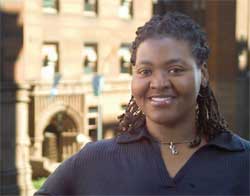New Faces: Felicia Moore
ASSISTANT PROFESSOR OF SCIENCE EDUCATION
MATHEMATICS, SCIENCE & TECHNOLOGY
WHAT SHE'LL BE TEACHING: "Science Methods for Early Childhood Education."
LAST JOB: "I was a visiting professor at Michigan State University in the Center for Curriculum Materials in Science. I taught science methods classes for pre-service students and interns."
WHY SHE BECAME A TEACHER: "Growing up, I thought I was going to be a physician. While I was working on my master's degree in biology, I encountered several problems along the way. The dean of the college suggested that I look into education. However, I was concerned about getting up in front of a class and talking. I realized that if I was this afraid to speak in front of others, then I needed to prove to myself that I could do it. When I took my education courses and began my student teaching, I knew I loved education."
MOST INFLUENTIAL TEACHER: "My 12th grade calculus teacher, who was a strong, African-American woman. She saw a lot of potential in me and pushed me to do things that I didn't think I could do. I grew up in a small town in North Carolina and was often the only African American in my honors and college prep classes. I didn't always feel like I belonged or that I received enough encouragement from my classmates and counselors. That year, I signed up for Algebra 3, but my schedule was changed. To my surprise, I was placed in a block calculus class. At the end of the year, my teacher told me that she was the one who put me into the higher-level class because she knew that I needed to ‘come out of my shell.' She helped me get one of two scholarships for college at UNC Chapel Hill."
ARTICLE THAT MOST INFLUENCED HER: "An article about feminist poststructuralism that I read in one of my adult education classes at Florida State University. I realized that these theories fit into how I saw the world. Now, they guide my research."
MOST IMPORTANT PROBLEM IN EDUCATION: "Motivation of students. There are many opportunities that an education can provide. Students should be encouraged to pursue as many avenues as possible for educating themselves and giving back to others."
Published Tuesday, Oct. 12, 2004
